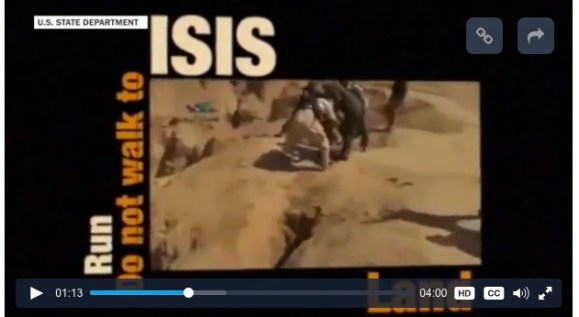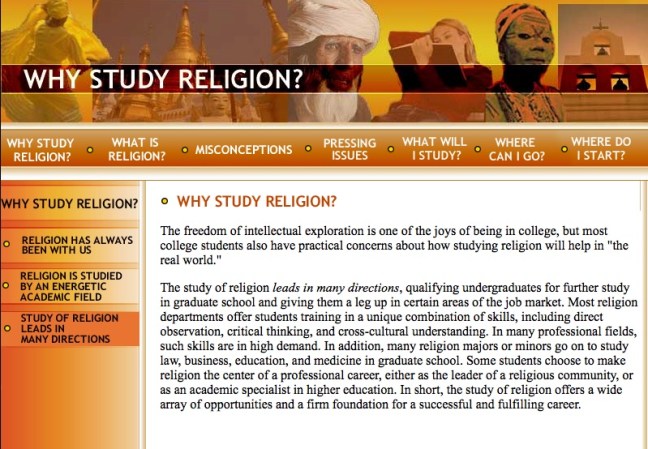I’m going to throw this out there: there’s no natural-fit position for the religious studies major.
And that’s not a bad thing.
Our discipline questions the very concept of natural, constructive, intrinsic good. And we lose ourselves when we trade the double-edged sword of criticism for comfort.
Now I share Gary Laderman’s sentiment about the possibilities for the religious studies student. The Emory department chair writes, “… each new major we graduate, no matter what direction their professional lives take, contributes to increased awareness and understanding of religion. That is a good thing.”
…as long as we remember not to lose sight of the thing itself.
Learning a Lesson
In high school, my English Language Arts teacher assigned a canon of literary devices. Simile, metaphor, deus ex machina, she explained, were all techniques that could make readers more receptive to an author’s meaning.
This may have been the first time I realized that we weren’t just learning about communication. She was teaching us about discourse—expression with effect.
The device that really caught my eye was the Pyrrhic victory.
According to our teacher, the Roman Republic had gone on a tear throughout the Italian Peninsula and had set its sights on the wider Mediterranean. But a Greek king named Pyrrhus resisted Rome’s forces. Pyrrhus’s soldiers fought valiantly, defeating Rome in battle more than once. Yet each victory came with the depletion of the Greek’s ranks. Meanwhile, Rome only grew larger, more vehement—ultimately winning the war.
Given this particularly crafty teacher, I now suspect that she intended to teach a number of lessons with that story.
She may have been showing us a common trope for drawing attention to a character’s tragic flaws. Was she reminding us to think about all the people silenced by the hyphen in “Greco-Roman history.” Or maybe she was just getting us ready for a midterm.
Twenty years later and she still has me thinking about the stories we tell about ourselves and others…
and the stories we tell about others that tell us about ourselves.
The Soul of Religious Studies?
When I recruit students to take my courses, I am tempted to quote Secretary of State John Kerry. He cannot help but see the role religion plays in both making difference and making a difference in the world.
Secretary Kerry finds religion to be a compelling force—rousing people to affect social change. In 2013 this broader understanding of religion led him to establish the “Office of Religion and Global Affairs.” And he is on record wishing he had majored in comparative religion.
For some, such words lend credence (and capital) to our most earnest sales pitches. It appears we in religious studies have something marketable.
But this is only true if all questions about religion are on the table.
Would we be free to assess the rhetoric of violence—as well as blood shed— on both sides of a conflict or would be limited to studying “the other?”
Might we ask how an agency plans to distinguish who is wearing a guise and who is authentic if religion is “not reducible to good…and bad…?” Would that distinction look like scholarship or the denouement of Scooby-Doo?

After all, it was a State Department agency—the Center for Strategic Counterterrorism Communications—that developed the anti-ISIS propaganda film “Welcome to ISIS Land.” The 2014 parody mimicked the neo-caliphate’s grotesque aesthetic to dissuade potential converts from joining the conflict in Syria.

By all accounts, the strategy proved an embarrassment and gave Kerry further impetus for seeking a “more sophisticated approach to religion.”
Oh Say Can You See
In a moment when classical college disciplines are on the chopping block, the fight against extremism seems to be a saving grace for religious studies.
And in this economic climate, a job is a job. Who am I to begrudge anyone trying to translate honest work into food on the table. Similarly I understand that my freedom to raise these kinds of questions is incumbent on the deeds and misdeeds of the USA.
But I remain unconvinced that state-sanctioned inquiry into religion is a natural fit for the religious studies student of any level.
In 2004, the American Academy of Religion launched StudyReligion.org to make the case for the discipline’s place in 21st century learned society.

I count it a Pyrrhic victory if our students get jobs that prohibit them from asking our primary question: what are the implications of parsing terms like “religion” and “extremism” for the purpose of indexing social difference? What good would it be to gain a job and forfeit your soul?
To quote cultural theorist Bruce Lincoln, “the end result of our definitional labors ought to problematize, and not normalize, the model that prompted their inception.”
In the American context, that means making clear that the stories of Martin Luther King Jr., George Washington, and Harriet Tubman show the thin line between national treasure and enemy of the state. When we repress our willingness to ask how that line is drawn, we have continued to draw it ourselves—for better or worse.
Here’s the thing…
To be indifferent to these questions is to forget the scholar’s place. That “place” philosopher Michel De Certeau writes, is different than the one “that produces and reproduces, as its effects, militant mobilizations, tactics of “making people believe,” and ecclesiastical institutions in a relationship of distance, competition, and future transformations with respect to the established powers.”

(as of 2015-2016, no longer taking new majors and is now under reconstruction)
A place when we can no longer ask about interests and agenda is a place where we cannot do what we do—in spite of the personal conviction, civic duty and market forces that make such positions attractive.
We know too much about the “psychology of militancy” and “critical sociology of ideologies.” They may not be “directly involved,” De Certeau feigns, but they are always are present in overtures of reform.
The American Anthropological Association learned this when the CIA headhunted ethnographers during the Cold War. More recently, the American Psychological Association is still reeling from the knowledge that some in their number may have added to the government’s quiver of enhanced interrogation techniques and torture practices.
Religious studies is a discourse. And like all expression, it too can have an effect.
Asking what you do with a religious studies degree is a perfectly fine question when it comes from students.
But for those firmly within the discipline, maybe the question is “What can’t you do with a religious studies major?”
Perhaps that will reveal to us what matters most.

Richard Newton, PhD is curator of Sowing the Seed and Assistant Professor of Religious Studies at Elizabethtown College. His scholarship focuses on the anthropology of scriptures. Follow him on Twitter and Instagram @seedpods.

